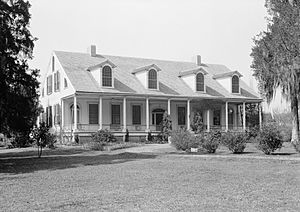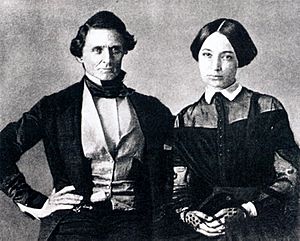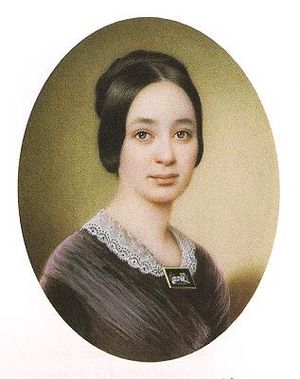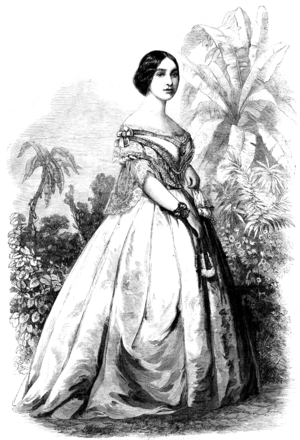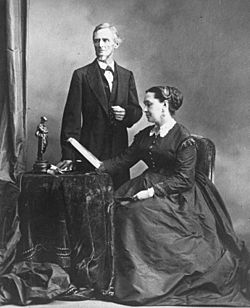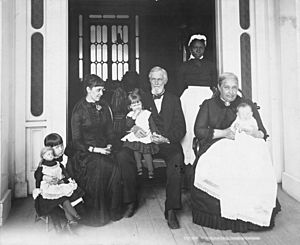Varina Davis facts for kids
Quick facts for kids
Varina Davis
|
|
|---|---|
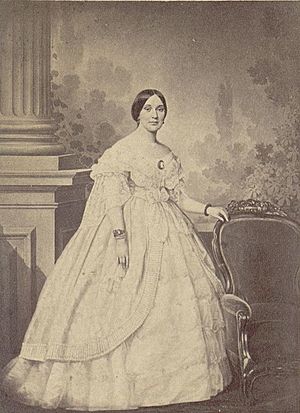 |
|
| First Lady of the Confederate States | |
| In role February 22, 1862 – May 10, 1865 Provisional: February 18, 1861 to February 22, 1862 |
|
| President | Jefferson Davis |
| Preceded by | Position established |
| Succeeded by | Position abolished |
| Personal details | |
| Born |
Varina Anne Banks Howell
May 7, 1826 Natchez, Mississippi, U.S. |
| Died | October 16, 1906 (aged 80) New York City, New York, U.S. |
| Cause of death | Pneumonia |
| Nationality | American |
| Spouses | |
| Children | 6 |
| Parents |
|
| Occupation | Writer |
Varina Anne Banks Howell Davis (May 7, 1826 – October 16, 1906) was the only First Lady of the Confederate States of America. She was the second wife of President Jefferson Davis.
She moved to a special house in Richmond, Virginia, in mid-1861. This was during the American Civil War. Varina was born and grew up in the South. She was educated in Philadelphia. She had family members fighting on both sides of the war. She also had different ideas for a woman in her public role. She did not support the Confederacy's views on slavery. She felt mixed about the war itself.
After the American Civil War, Varina Davis became a writer. She finished her husband's life story. Kate (Davis) Pulitzer, who was related to her husband, asked her to write articles. She eventually wrote a regular column for the New York World newspaper. Her husband died in 1889. In 1891, Davis moved to New York City with her youngest daughter, Winnie. She enjoyed living in the city. When she was older, she tried to bring together important people from the North and South.
Contents
Early Life and Education
Varina Anne Banks Howell was born in 1826 in Natchez, Mississippi. Her parents were William Burr Howell and Margaret Louisa Kempe. Her father came from a well-known family in New Jersey. His father, Richard Howell, was the Governor of New Jersey several times.
William Howell moved to Mississippi where new cotton farms were growing fast. There, he married Margaret Louisa Kempe (1806–1867). Her wealthy family had moved to Mississippi from Virginia. Margaret's father, Colonel James Kempe, was a successful farmer and landowner. When Margaret married William Howell, her father gave her 60 slaves and 2,000 acres of land.
William Howell worked in many jobs, like farming and banking. But he never had lasting financial success. He lost most of Margaret's large gift through bad investments. They often had money problems.
Varina was the second of eleven children. Seven of them lived to be adults. She was described as tall and thin. She had an olive skin tone.
When Varina was thirteen, her father went bankrupt. Their family home and slaves were taken to be sold. Her rich relatives helped them get their property back. This was one of many big changes Varina saw in her life. She grew up in a house called The Briars. She learned that her family depended on her mother's wealthy relatives.
Varina Howell went to school in Philadelphia, Pennsylvania. She studied at Madame Grelaud's French School. This was a respected school for young ladies. One of her classmates was Sarah Anne Ellis. She later became a wealthy widow and helped the Davises after the Civil War.
While in Philadelphia, Varina met many of her northern relatives. She wrote to some of them her whole life. She called herself a "half-breed" because of her ties to both the North and South. After a year, she returned to Natchez. There, Judge George Winchester, a family friend, taught her privately. She was smart and well-educated. This sometimes caused problems with what Southern society expected from women.
In 1843, when she was 17, Varina was invited to a Christmas party. It was at Hurricane Plantation, a 5,000-acre property. This was owned by Joseph Emory Davis, a family friend. His brother, Jefferson Davis, was also there. He was 35 years old, a former Army officer, and a widower. He worked as a farmer.
Marriage and Family Life
Jefferson Davis was a widower when he met Varina. His first wife had died of malaria three months after their wedding. Davis had been sad and private for eight years. He was starting to get involved in politics.
Davis asked Varina's parents for permission to court her. They first said no because of their different backgrounds, ages, and political views. Davis was a Democrat, and the Howells were Whigs. Varina's mother was also worried about Jefferson's strong loyalty to his family. The Howells finally agreed. The couple got engaged soon after.
Their wedding was planned for Christmas 1844, but it was canceled. In January 1845, Varina was sick with a fever. Davis visited her often. They got engaged again. They married on February 26, 1845, at her parents' house. Only a few of the bride's family and friends were there.
Their short honeymoon included visiting Davis's mother and his first wife's grave. The newlyweds moved to Brierfield. This was a farm Davis had started on land his brother let him use. They first lived in a small cottage.
Soon after their marriage, Davis's widowed sister, Amanda, came to live on the Brierfield property. She brought her seven youngest children. Her brothers decided she should share the big house the Davises were building. But they had not asked Varina. This was an example of what Varina later called family interference. Also, her brother-in-law, Joseph Davis, was very controlling. He controlled both his younger brother and Varina, especially when her husband was away. At the same time, Varina's parents became more dependent on the Davises for money. This made her feel embarrassed.
The couple spent long periods apart early in their marriage. Jefferson Davis traveled to give speeches and campaign for himself and others. He was also away during the Mexican–American War (1846–1848). Varina Davis was left under the care of Joseph Davis, whom she disliked. Her letters to her husband showed her unhappiness.
Life in Washington, D.C.
Jefferson Davis was elected to the U.S. House of Representatives in 1846. Varina went with him to Washington, D.C., which she loved. She enjoyed the social life and meeting smart people. She was known for saying unusual things. For example, she said that "slaves were human beings." She also called everyone a "half breed" because of her own family ties in both the North and South. The Davises lived in Washington, D.C., for most of the next fifteen years. This gave Varina Davis a wider view of the world than many Southerners. It was her favorite place to live. However, her husband preferred life on their Mississippi farm.
Soon, Jefferson left Congress to serve as an officer in the Mexican–American War. Varina Davis returned to Briarfield for a time. She felt annoyed under the watch of her brother-in-law, Joseph. Letters between the Davises from this time show their problems. After her husband returned from the war, Varina did not immediately go with him to Washington. The Mississippi legislature had chosen him to fill a Senate seat.
Eventually, the couple worked things out. She joined her husband in Washington. He was well-known for a new senator because of his connections. Varina Davis enjoyed the social life of the capital. She quickly became one of the city's most popular hostesses.
After seven years without children, Varina Davis gave birth to a son, Samuel, in 1852. Her letters from this time show her happiness. They also show Jefferson as a loving father. The couple had six children in total:
- Samuel Emory Davis, born July 30, 1852. He died June 30, 1854, from an unknown illness.
- Margaret Howell Davis, born February 25, 1855. She was the only Davis child to marry and have a family. She married Joel Addison Hayes, Jr., in 1876. They lived in Memphis, Tennessee, and later moved to Colorado Springs, Colorado. She died on July 18, 1909, at age 54.
- Jefferson Davis, Jr., born January 16, 1857. He died in Memphis, Tennessee, of yellow fever at age 21 on October 16, 1878.
- Joseph Evan Davis, born on April 18, 1859. He died at age five from an accidental fall on April 30, 1864.
- William Howell Davis, born on December 6, 1861. He died of diphtheria on October 16, 1872.
- Varina Anne "Winnie" Davis was born on June 27, 1864. She was known as the "Daughter of the Confederacy." She died at age 34 on September 18, 1898. She never married.
The Davises were very sad when their first child died in 1854. Varina Davis stopped going out socially for a while. In 1855, she had a healthy daughter, Margaret. Then came two sons, Jefferson, Jr., and Joseph. The early deaths of all four of their sons caused great sadness for both Davises.
During the Pierce Administration, Davis was made Secretary of War. He and President Franklin Pierce became good friends. Their wives also respected each other. The Pierces lost their last child shortly before the inauguration. The Davises often hosted official events at the White House for the President and his wife.
Confederate First Lady
Jefferson Davis left the U.S. Senate in 1861 when Mississippi left the Union. Varina Davis returned home with their children. She expected him to become a general in the Confederate army. Instead, he was chosen as President of the Confederate States of America. She did not go with him to Montgomery, Alabama, the new capital, for his inauguration. A few weeks later, she followed and took on her duties as the First Lady of the Confederacy.
Varina felt worried about the war. She supported the Union but not slavery.
In the summer of 1861, Davis and her husband moved to Richmond, Virginia. This was the new capital of the Confederacy. They lived in a house known as the White House of the Confederacy for the rest of the war. Varina tried to do what was expected of her. But people felt she was not fully committed. Her time as First Lady was difficult. White residents of Richmond often criticized Varina Davis.
In December 1861, she gave birth to their fifth child, William. In 1864, some of the Davises' household slaves escaped. In spring 1864, five-year-old Joseph Davis died from a fall at the house in Richmond. A few weeks later, Varina had their last child, a girl named Varina Anne Davis. She was called "Winnie." Winnie became known as "the Daughter of the Confederacy." Stories and pictures of her were shared to boost spirits during the war. She kept this nickname her whole life.
After the War
When the war ended, the Davises tried to escape to Europe. But they were captured by federal troops. Jefferson Davis was put in prison at Fort Monroe for two years. Varina Davis was left without money. She was told to stay in Georgia. She sent her older children to friends in Canada for safety. At first, she could not contact her husband. Varina worked very hard to get him released. She tried to make people aware of what she saw as his unfair imprisonment.
After a few months, Varina was allowed to write to him. Articles and a book about his time in prison helped public opinion turn in his favor. Davis and young Winnie were allowed to join Jefferson in his prison cell. The family was later given a more comfortable apartment.
Jefferson Davis was released on bail. He was never tried for treason. But he had lost his home, most of his money, and his U.S. citizenship. His citizenship was given back to him later. The Davis family traveled a lot in Europe and Canada. Jefferson looked for work to rebuild their money. Davis became president of an insurance company in Memphis. The family started to get some money back. But then the Panic of 1873 happened. His company went bankrupt. In 1872, their son William Davis died of typhoid fever. This added to their sadness.
While visiting their daughters in schools in Europe, Jefferson Davis got a job. He was an agent for an English group buying cotton from the South. He returned to the U.S. for this work. Varina Davis stayed in England for several months.
For several years, the Davises lived apart more than together. Davis was unemployed for most of the years after the war. In 1877, he was sick and almost broke. He was told to live near the sea for his health. He accepted an invitation from Sarah Anne Ellis Dorsey, a wealthy widow. She invited him to her farm, Beauvoir, in Biloxi. Sarah Dorsey had been Varina's classmate in Philadelphia. She was a respected writer. She let Davis use a cottage on her property. There, she helped him organize and write his book about the Confederacy. She also invited Varina Davis to stay with her.
Davis and her oldest daughter, Margaret, did not like her husband's friendship with Dorsey. After Varina Davis returned to the United States, she lived with Margaret and her family for a time. Slowly, she started to get along with her husband again. She was with him at Beauvoir in 1878. They learned that their last surviving son, Jefferson Davis, Jr., had died. He died during a yellow fever outbreak in Memphis.
Sarah Dorsey wanted to help the former president. She offered to sell him her house at a fair price. Learning she had cancer, Dorsey changed her will. She left Jefferson Davis full ownership of the home. She also left him much of her money. Her relatives tried to challenge the will but failed.
Dorsey's gift gave Davis enough money to support Varina and Winnie. They lived comfortably in his final years. When Winnie Davis finished her education, she joined her parents at Beauvoir. She had fallen in love in college. But her parents did not approve. Her father did not like that the man was from a "prominent Yankee and abolitionist family." Her mother did not like that he had no money and many debts. Winnie had to reject this man and never married.
Dorsey's gift made Winnie Davis the heir after Jefferson Davis died in 1889. In 1891, Varina and Winnie moved to New York City. After Winnie died in 1898, she was buried next to her father in Richmond, Virginia. Varina Davis inherited the Beauvoir farm.
Widowhood and Later Years
After her husband died, Varina Howell Davis finished his life story. She published it in 1890 as Jefferson Davis, A Memoir. At first, the book did not sell many copies. This disappointed her hopes of earning money.
Kate Davis Pulitzer was a distant cousin of Jefferson Davis. She was married to Joseph Pulitzer, a big newspaper publisher in New York. She had met Varina Davis during a visit to the South. Kate asked Varina to write short articles for her husband's newspaper, the New York World. In 1891, Varina Davis accepted the Pulitzers' offer to become a full-time writer. She moved to New York City with her daughter Winnie. They enjoyed the busy city life. Some white Southerners criticized Davis for moving North. They saw her as a public figure of the Confederacy.
Davis and her daughter both worked as writers. They lived in different hotels in New York City. Varina Davis wrote many articles for the newspaper. Winnie Davis published several novels.
After Winnie died in 1898, Varina Davis inherited Beauvoir. In October 1902, she sold the farm to the Mississippi Division of the Sons of Confederate Veterans for $10,000. She said the place should be used as a home for Confederate veterans. Later, it would be a memorial to her husband. The SCV built buildings there. Thousands of veterans and their families lived there.
Since 1953, the house has been a museum about Davis. Beauvoir is now a National Historic Landmark. The main house has been fixed up. A museum was built there, housing the Jefferson Davis Presidential Library.
Varina Howell Davis was one of many important Southerners who moved North for work after the war. They were sometimes called "Confederate carpetbaggers".
In the years after the war, Varina became friends with Julia Dent Grant. She was the widow of former general and president Ulysses S. Grant. Grant had been one of the most disliked men in the South. Varina also met Booker T. Washington, who led the Tuskegee Institute, a college for Black students. When she was old, Davis wrote some of her thoughts. She "declared in print that the right side had won the Civil War."
Final Years
Varina was sad when her daughter Winnie died in 1898. Winnie was the last of her six children to die before her. But Davis kept writing for the World newspaper. She enjoyed a daily carriage ride through Central Park.
She was active socially until her health got bad in her last years. This made her stop working and public life. Davis died at age 80 from double pneumonia in her hotel room on October 16, 1906. Her daughter Margaret Davis Hayes, and several grandchildren and great-grandchildren, survived her.
Legacy and Honors
Varina Howell Davis had a funeral procession through the streets of New York City. Her coffin was taken by train to Richmond. She was buried with full honors by Confederate veterans at Hollywood Cemetery. She was buried next to her husband and their daughter Winnie.
A painting of Mrs. Davis, called Widow of the Confederacy (1895), was made by artist Adolfo Müller-Ury. It is kept at the museum at Beauvoir. In 1918, Müller-Ury gave his portrait of her daughter, Winnie Davis, to the Museum of the Confederacy in Richmond, Virginia.
On August 29, 2005, Hurricane Katrina badly damaged Beauvoir. This is where the Jefferson Davis Presidential Library is located. The home was fixed and reopened on June 3, 2008. Varina Howell Davis's diamond and emerald wedding ring was one of the few valuable things she kept. It was held by the Museum at Beauvoir and was lost during Hurricane Katrina. It was found on the grounds a few months later and returned to the museum.
In Other Media
- Harnett Kane's Bride of Fortune (1948), a historical novel about Mrs. Davis.
- Charles Frazier's 2018 novel Varina.
 | Delilah Pierce |
 | Gordon Parks |
 | Augusta Savage |
 | Charles Ethan Porter |


